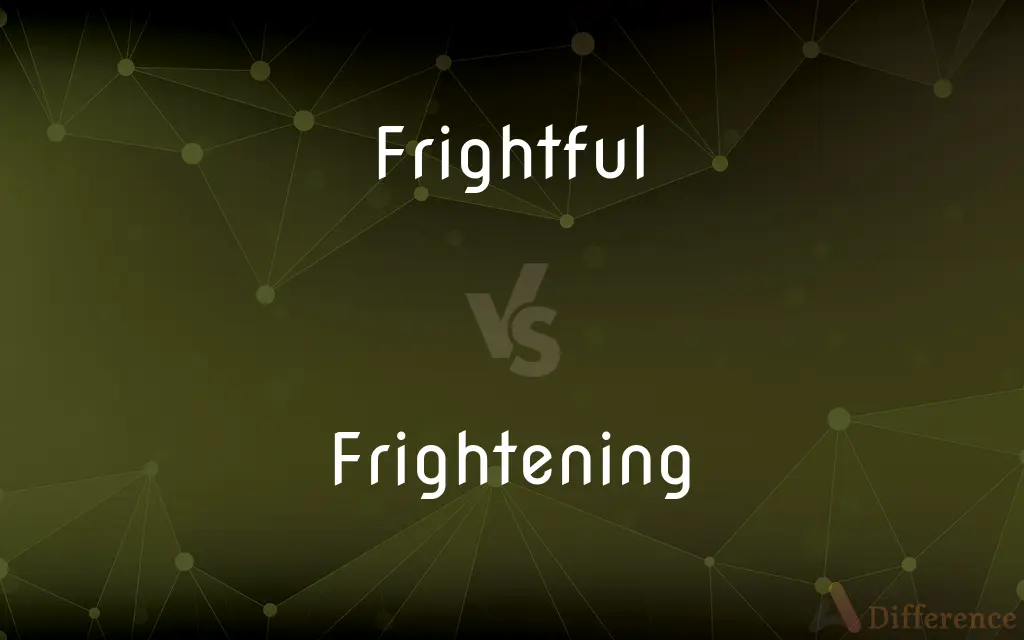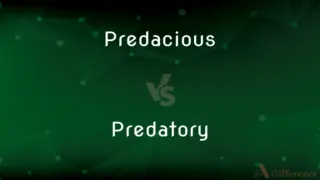Frightful vs. Frightening — What's the Difference?
By Fiza Rafique & Maham Liaqat — Updated on April 9, 2024
Frightful conveys a sense of intense displeasure or horror, often subjective, while frightening refers to the ability to induce fear or alarm objectively.

Difference Between Frightful and Frightening
Table of Contents
ADVERTISEMENT
Key Differences
Frightful is used to describe something that is extremely unpleasant, shocking, or horrifying to the individual experiencing it. This term often carries a subjective implication, meaning that what is frightful to one person may not be so to another. Whereas, frightening pertains to the inherent quality of an object, situation, or event that causes fear, apprehension, or dread in anyone who encounters it, making it more objective in its application.
When something is described as frightful, it emphasizes the extreme nature of the experience or sensation, such as a frightful nightmare or a frightful scream, suggesting a level of intensity that is deeply unsettling. On the other hand, frightening focuses on the capacity to evoke fear, as in a frightening storm or a frightening prediction, highlighting the potential to disturb or alarm.
Frightful can also carry a broader range of connotations, extending to the extremely bad, severe, or intense, like frightful weather or a frightful accident, without necessarily inducing fear. Frightening, however, is more narrowly focused on the aspect of fear and its direct causes, emphasizing the reaction it seeks to evoke.
In everyday usage, frightful might be employed in more hyperbolic or exaggerated contexts to describe situations that are very bad or unpleasant, such as frightful manners or a frightful waste of resources. Frightening, conversely, retains a more consistent association with genuine fear and alarm, making it a choice for describing situations that are likely to inspire fear in a real sense.
The distinction between frightful and frightening also reflects in their adverbial forms, with 'frightfully' often used to intensify adjectives in a somewhat colloquial manner, e.g., frightfully expensive, whereas 'frighteningly' tends to preserve its literal meaning related to fear, e.g., frighteningly realistic.
ADVERTISEMENT
Comparison Chart
Definition
Extremely unpleasant, shocking, or horrifying from a subjective perspective.
Having the ability to induce fear or alarm objectively.
Connotation
Can imply extreme displeasure or horror, not limited to fear.
Directly associated with causing fear or alarm.
Usage
Often used hyperbolically to describe extremely bad or intense situations.
Used to describe situations or things that genuinely inspire fear.
Focus
Emphasizes the severity or intensity of an experience.
Highlights the potential to evoke a fear response.
Examples
Frightful scream, frightful accident.
Frightening storm, frightening prediction.
Compare with Definitions
Frightful
Extremely unpleasant or shocking.
The accident scene was frightful.
Frightening
Causing fear or alarm.
The sudden noise was frightening.
Frightful
Very bad in quality.
He had a frightful sense of fashion.
Frightening
Likely to inspire fear.
He told a frightening tale.
Frightful
Very great or intense.
She felt a frightful pain in her arm.
Frightening
Associated with fear.
Her frightening demeanor kept people at bay.
Frightful
Used to emphasize negative aspects.
What a frightful mess this is!
Frightening
Making someone afraid.
This haunted house is frightening.
Frightful
Inspiring horror or fear.
The movie was frightfully scary.
Frightening
Alarming in nature.
The statistics are frightening.
Frightful
Very unpleasant, serious, or shocking
There's been a most frightful accident
Frightening
To fill with fear; alarm.
Frightful
Causing disgust or shock; horrifying.
Frightening
To drive or force by arousing fear
The suspect was frightened into confessing.
Frightful
Causing fright; terrifying.
Frightening
To become afraid
Told ghost stories to campers who frightened easily.
Frightful
Excessive; extreme
A frightful liar.
Frightening
Causing fear; of capable of causing fear; scary.
Riding the rollercoaster was a frightening experience.
Frightful
Disagreeable; distressing
Frightful weather.
Frightening
(figuratively) Awful, terrible, very bad.
Frightful
(obsolete) Full of fright, whether
Frightening
Present participle of frighten
The scientist was frightening the timid children.
Frightful
Afraid, frightened.
Frightening
To inspire with fear
Frightful
Timid, fearful, easily frightened.
Frightening
Causing fear or dread or terror;
The awful war
An awful risk
Dire news
A career or vengeance so direful that London was shocked
The dread presence of the headmaster
Polio is no longer the dreaded disease it once was
A dreadful storm
A fearful howling
Horrendous explosions shook the city
A terrible curse
Frightful
Full of something causing fright, whether
Frightful
Genuinely horrific, awful, or alarming.
Frightful
(hyperbolic) Unpleasant, dreadful, awful (also used as an intensifier).
Frightful
(dialect) Frightfully; very.
Frightful
Full of fright; affrighted; frightened.
See how the frightful herds run from the wood.
Frightful
Full of that which causes fright; exciting alarm; impressing terror; shocking; as, a frightful chasm, or tempest; a frightful appearance.
Frightful
Provoking horror;
An atrocious automobile accident
A frightful crime of decapitation
An alarming, even horrifying, picture
War is beyond all words horrible
An ugly wound
Frightful
Extreme in degree;
In a frightful hurry
Spent a frightful amount of money
Frightful
Extremely distressing;
Fearful slum conditions
A frightful mistake
Suffered terrible thirst
Common Curiosities
How does frightening differ from frightful?
Frightening specifically pertains to the ability to induce fear or alarm, being more objective compared to the often subjective and broader unpleasantness implied by frightful.
Is frightening always related to fear?
Yes, frightening is directly associated with causing fear or alarm.
What does frightful mean?
Frightful refers to something extremely unpleasant, shocking, or horrifying, often carrying a subjective implication.
What are some synonyms for frightful?
Some synonyms for frightful include horrifying, terrible, or appalling.
Can something be frightful without being frightening?
Yes, something can be considered frightful due to its extreme unpleasantness or severity without necessarily being frightening, which implies causing fear.
How is frightful used in a sentence?
"Frightful" can be used to describe something very unpleasant or shocking, e.g., "The weather outside is frightful."
Is frightful used more in British or American English?
Frightful can be used in both, but it may carry a slightly more formal or old-fashioned tone in American English.
Can the meaning of frightful and frightening overlap?
Yes, in some contexts, the meanings can overlap, especially when describing something that is both extremely unpleasant and capable of inducing fear.
Can a situation be both frightful and frightening?
Yes, a situation can be both frightful in its extremity or unpleasantness and frightening in its capacity to induce fear.
Is frightening a stronger term than frightful?
Not necessarily stronger, but "frightening" is more focused on the aspect of causing fear, while "frightful" has a broader range of unpleasantness.
What are some synonyms for frightening?
Synonyms for frightening include scary, alarming, or terrifying.
Do frightful and frightening have the same adverb forms?
No, they form different adverbs: "frightfully" for frightful, often used colloquially to intensify, and "frighteningly" for frightening, maintaining its literal meaning related to fear.
Can the use of frightful be considered exaggeration?
Yes, "frightful" is often used hyperbolically to describe situations that are very unpleasant or bad.
How does context affect the use of frightful and frightening?
The context determines whether the emphasis is on the subjective experience of horror or unpleasantness (frightful) or on the objective ability to cause fear (frightening).
How can I choose between frightful and frightening when describing a scene?
Consider whether you wish to emphasize the subjective horror or unpleasantness of the scene (frightful) or its inherent ability to induce fear (frightening).
Share Your Discovery

Previous Comparison
Predacious vs. Predatory
Next Comparison
Sinification vs. SinicizationAuthor Spotlight
Written by
Fiza RafiqueFiza Rafique is a skilled content writer at AskDifference.com, where she meticulously refines and enhances written pieces. Drawing from her vast editorial expertise, Fiza ensures clarity, accuracy, and precision in every article. Passionate about language, she continually seeks to elevate the quality of content for readers worldwide.
Co-written by
Maham Liaqat














































